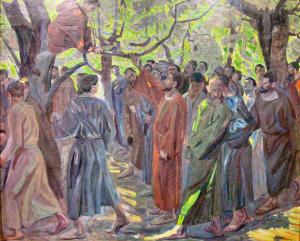
The incarnation must not be treated as the ultimate form of deus ex machina; when it is perceived as God acting in a contrived manner to fix the problem of sin, its purpose is misunderstood. God the Son, the Logos, entered creation in order to deify it, completing and fulfilling what was intended for it since its inception.
Evil perverted creation, but it could not stop God’s plan for it. It was important for the incarnation to engage evil, to take on the sin of the world and cast is aside from within, following the principles God established for creation from its beginning, but that was not God’s ultimate intention for the incarnation. The true goal was the deification of creation. This is why it can be said that the incarnation was always intended by God, and this intention could be, and was, perceived, at least in part, by those who opened themselves up to God and the revelation contained of God in nature itself.
Even in a fallen state, people could and often did discern truths about God. Many of them desired to act upon those truths, to follow God, even if they did so imperfectly. Others, however, embraced their fallen state, and so fought against those truths, turning themselves further away from God by engaging a great number of injustices in the world. Often, this was done indirectly, as people fought for or against their own conscience, and so for or against the truth of God contained in their conscience.
Even when evil was embraced, it could not completely destroy the good; no one is purely evil, for everyone, according to their nature, is good. Sin corrupts the person, so that what they become form sin is less than what they are by nature. Likewise, through that corruption, their ability to perceive and apprehend the truth is diminished, as all things become filtered in and through the lens of that sin. No matter how much evil humanity engaged, its natural goodness still lay deep inside, allowing many to turn inward, get to know themselves, and discern that natural goodness for themselves. But this can be extremely difficult without some sort of external direction. Hence, God, working with humanity, engaged it, sending teachers like Moses into the world so that we would not be completely taken over by sin, as St. Antony the Great indicated: “That you may know therefore that God always loves His creatures – their substance being immortal, not to be dissolved with their bodies – He saw how the intellectual nature had gone down altogether into the abyss, dead altogether, and the implanted law of the covenant was dried up. And of his goodness He visited mankind by Moses.” [1]
Despite sin, despite all the evil which covered up and wounded the good of creation, God has always been at work with creation, trying to lift it up from within. There have always been some who found themselves drawn to God, the righteous among the nations. They followed the natural covenant, their conscience, and so followed after God. They found God working within themselves. They saw the truth of God within. God was at work with humanity from within, using the goodness inherent within creation, as the way to raise it up and overcome the defilement of sin. God, likewise, was at work, helping those who sought the good so that they could persevere against those who would abandon it and engage vice. “I think you are not ignorant that the enemies of virtue are always plotting against the truth. For this cause not at one time only did God visited His creatures, but from the beginning there were some who were prepared to come to their own Creator by the Law of His covenant implanted in them, being taught by it to worship the Creator as is right.” [2]
Grace takes the good which is exists and lifts it up, allowing it to become greater than it was before. If there is some need for purification, grace also works for that good end. The incarnation engages this pattern and fulfills it, for through it, God meets humanity, but now instead of using some messenger, God does it directly by becoming a part of it, coming face to face with it. The natural good in humanity is taken up and assumed by the Logos and allowed to be seen for what it is: good. What was hindering that good can be overcome and fixed. Grace makes it possible. We can see this suggested in the meeting of Jesus with the tax collector, Zacchaeus:
And there was a man named Zacchaeus; he was a chief tax collector, and rich. And he sought to see who Jesus was, but could not, on account of the crowd, because he was small of stature. So he ran on ahead and climbed up into a sycamore tree to see him, for he was to pass that way. And when Jesus came to the place, he looked up and said to him, “Zacchaeus, make haste and come down; for I must stay at your house today.” So he made haste and came down, and received him joyfully. And when they saw it they all murmured, “He has gone in to be the guest of a man who is a sinner.” And Zacchaeus stood and said to the Lord, “Behold, Lord, the half of my goods I give to the poor; and if I have defrauded any one of anything, I restore it fourfold.” And Jesus said to him, “Today salvation has come to this house, since he also is a son of Abraham. For the Son of man came to seek and to save the lost” (Lk. 19:2-10 RSV).
Jesus confirmed salvation had come to Zacchaeus. This means, before his encounter with Jesus, Zacchaeus the tax collector was among the lost. He had made himself rich, and the way he did so was through the wealth of others. Tax collectors made money based what they collected from others. Zacchaeus was rich not only with money, but also with sins, because the means by which he collected taxes was not always just. And yet Zacchaeus was not entirely without good; he desired to see Jesus and Jesus desired to be with him, just as Jesus desires to be with us all, no matter what we have done.
In his meeting with Jesus, we find that, indeed, there was still some good left in Zacchaeus; being in the presence of Jesus, the presence of the kingdom of God itself, Zacchaeus suddenly saw how far he had gone away from that good and discerned what he had to do: give back, with interest, what he had unjustly taken from others, while helping others from the abundance of his own wealth. Thus, he understood that those who gained wealth and power through sin will have to do more than pay back what they took, but they will have to pay it back with interest; reparations are always a part of the process of purification and sanctification.
It was only after his meeting with Jesus, only after Jesus came to his house and filled it with purifying grace, that we find this conversion taking place, a conversion which was based upon the innate goodness which Zacchaeus had possessed but had also previously undermined through his own actions. This, of course, is also true for all of us, indeed, for the whole of creation – the advent of Christ brought Christ’s grace to the world, allowing the good within it to once again be revealed so we can fulfill the expectations and directions of that good instead of stumbling around, with little or no virtue of our own.
We are called to grace. Out of love for humanity, God became one of us. Jesus reveals the depth of God’s love, as God willingly became weak and apparently foolish for our sake. “Now therefore it is right that we also should set ourselves free from His advent, that by His foolishness He may make us wise, and by His poverty may enrich us, and by His weakness strengthen us, and confer resurrection upon us all, destroying him that had the power of death.”[3] This is the ultimate refutation of the suggestion that the incarnation can be explained as some sort of deus ex machina. God brings saving grace, the kingdom of God, to the world, not through might, but through kenotic weakness. God’s love embraced creation, allowing creation, and what creation set up for itself, to be the context of the incarnation. Creation established for itself a setting which God would not undermine but only affirm, so that the good which remained within could be and would be reinforced by God and used to overcome the evil which defiled it. What appeared to be foolishness by those who want God to act as an absolute authoritarian is revealed truly to be the act of wisdom itself. God works with us – God does not override us with acts of power, making all that we do worthless. God is with us and loves us and will always act with self-kenotic love so that our goodness can reveal itself, just as we see the goodness of Zacchaeus, buried in the deep within, revealed itself once Jesus came to him and his home.
home.
[1] St. Antony the Great, “Letter V” in The Letters of Saint Antony the Great. Trans. Derwas J. Chitty (Fairacres, Oxford: SLG Press, 1991), 14.
[2] St. Antony the Great, “Letter III” in The Letters of Saint Antony the Great. Trans. Derwas J. Chitty (Fairacres, Oxford: SLG Press, 1991), 9.
[3] St. Antony the Great, “Letter III,” 10.
Stay in touch! Like A Little Bit of Nothing on Facebook.
If you liked what you read, please consider sharing it with your friends and family!













